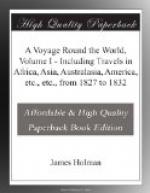The invention of the apparatus to which I allude is invaluable to those who are afflicted with blindness. It opens not only an agreeable source of amusement and occupation in the hours of loneliness and retirement, but it affords a means of communicating our secret thoughts to a friend, without the interposition of a third party; so that the intercourse and confidence of private correspondence, excluded by a natural calamity, are thus preserved to us by an artificial substitute. By the aid of this process, too, we may desire our correspondent to reply to our inquiries in a way which would be quite unintelligible to those to whom the perusal of the answer might be submitted. This apparatus, which is called the “Nocto via Polygraph,” by Mr. Wedgwood, the inventor, is not only useful to the blind, but is equally capable of being rendered available to all persons suffering under diseases of the eyes; for, although it does not assist you to commit your thoughts to paper with the same facility that is attained by the use of pen and ink, it enables you to write very clearly and legibly, while you have the satisfaction of knowing that you are spared all risk of hurting your sight. It is but an act of justice to refer such of my readers as may feel any curiosity on this subject, to Mr. Wedgwood, for full particulars respecting his various inventions for the use of the blind.
Having given these personal explanations—rendered necessary by the peculiarity of my situation, and the very general curiosity which appears to exist on the subject, if I may judge by the frequency of the interrogatories that are put to me—will now conclude my preliminary observations,
Nor
will I thee detain
With poet’s fictions, nor oppress
thine ear
With circumstance, and long exordiums
here;
but place myself at once on board H.M.S. Eden, at Woolwich, on the 1st of July, 1827, having been previously invited to take a passage to the coast of Africa, by her captain, W.F.W. Owen, Esq., who was appointed superintendent of a new settlement about to be established on the island of Fernando Po. The commission with which this gentleman was charged, afforded him peculiar advantages, as he was to retain the command of his ship, independently of the Commodore on the African station, for the purpose of facilitating his operations in the island. I had resolved to visit Sierra Leone, and other places on the western coast of Africa, principally from an early anxiety I felt to explore that part of the world, and also, strange and paradoxical as it may appear, for the benefit of my health. That a man should visit Sierra Leone for the benefit of his health, seems to be as unreasonable as if he were to seek for the vernal airs of the south in the inclement region of Siberia. But, I am strongly inclined to believe, that the apprehensions of European travellers on this subject are often as fatal as the climate that produces them. In my own case, I was not




